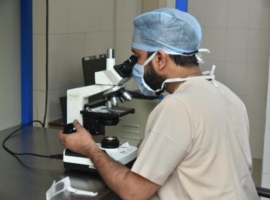Understanding Donor Egg Gametes
Overview of Donor Egg Gametes
If you or someone you know is considering this option for getting pregnant, it’s crucial to have a clear understanding of what donor egg gametes are and all that it entails. In this guide, we’ll delve into the world of donor egg gametes, exploring who might consider this option, the process of finding a suitable donor in our IVF center in Mumbai, legal and ethical considerations, emotional and psychological aspects, support systems, success rates, and the availability of IVF treatment in Mumbai at Dr L H Hiranandani Hospital.
What are Donor Egg Gametes?
Donor egg gametes involve using eggs from a woman other than the intended mother for assisted reproduction. These donated eggs are typically fertilized with sperm from the partner, creating embryos that can be implanted into the recipient’s uterus. This approach is often chosen by individuals or couples facing infertility due to factors like poor egg quality, genetic concerns, or low AMH levels. Donor egg gametes offer an alternative path to parenthood, providing hope and the opportunity to build a family when natural conception is not feasible.
Who Might Consider Donor Egg Gametes?
Many individuals and couples opt for donor egg gametes for various reasons. This option is often considered by:
– Women with diminished ovarian reserve or poor egg quality
– Women with genetic disorders they wish to avoid passing on
– Couples facing repeated IVF failures / recurrent pregnancy losses
Choosing donor egg gametes is a deeply personal decision, and it’s important to consult with a fertility specialist to determine if it’s the right path for you.
Finding a Suitable Donor
Finding a suitable donor for the process of donor egg gametes involves a rigorous selection procedure. Potential donors go through a comprehensive screening process, including medical evaluations, genetic and psychological assessments, infectious disease testing, hormone level checks, and background investigations. Once a donor successfully passes these evaluations, they are added to a database, allowing recipients to choose a donor based on their preferences. Some recipients may opt for known donors, such as friends or family, while others prefer anonymous donors. This crucial step ensures that the donor’s health and genetic profile align with the recipient’s needs and preferences.
Screening and Selection Process
In our best IVF hospital in Mumbai, egg donors go through a rigorous screening process to ensure they are suitable candidates. This process includes:
– Medical history assessment
– Genetic screening
– Psychological evaluation
– Infectious disease testing
– Hormone level testing
– Lifestyle and background checks
Once a donor passes these assessments, they are added to a database.
Legal and Ethical Considerations
The use of donor egg gametes also raises some legal and ethical issues that need to be addressed by the donors, recipients, clinics, and society at large. Some of these issues are:
Health Issues
Donating eggs involves a medical procedure that carries some risks and side effects for the donor. The donor has to undergo hormonal stimulation, egg retrieval, and sometimes anesthesia. These can cause complications such as ovarian hyperstimulation syndrome, bleeding, infection, or damage to the ovaries or other organs. The donor should be fully informed of these risks and consent to them before donating eggs.
The recipient of donor egg gametes also faces some health risks, such as the possibility of multiple pregnancies, ectopic pregnancy, miscarriage, or birth defects. The recipient should be screened for any medical conditions that may affect the pregnancy or the child’s health. The recipient should also be aware of the genetic background of the donor and the potential implications for the child.
Anonymity of Donor
In India, there is no law that regulates the identity disclosure of the donor or the child born from donor egg gametes. The donor and the recipient can choose to remain anonymous or to share their personal information with each other or with the child. However, this choice may have consequences for the psychological and emotional well-being of the parties involved.
Some donors may prefer to remain anonymous to protect their privacy or to avoid any future contact or responsibility for the child. Some recipients may prefer to keep the donor’s identity secret to avoid any social stigma or legal complications. However, some donors may want to know the outcome of their donation or to have some contact with the child. Some recipients may want to acknowledge the donor’s contribution or to provide the child with information about their biological origins. Some children may want to know their genetic identity or to meet their biological mother.
The anonymity of the donor also raises questions about the rights and interests of the child. The child may have a right to know their genetic identity, medical history, or cultural heritage. The child may also have a right to inherit from the donor or to claim any legal or moral obligations from the donor. The donor may have a right to know the fate of their genetic material or to have a say in the upbringing of the child. The recipient may have a right to protect the privacy and integrity of their family or to decide the best interests of the child.
Surplus Embryos
When donor egg gametes are used for IVF, there may be more embryos created than needed for a single transfer. These surplus embryos can be frozen and stored for future use, donated to another couple, donated for research, or discarded. Each of these options has legal and ethical implications that need to be considered by the donor, the recipient, and the clinic.
The donor and the recipient should agree on the disposition of the surplus embryos before the donation takes place. They should also consider the possibility of changing their minds or circumstances in the future. The clinic should follow the agreed-upon plan and respect the wishes of the donor and the recipient. The clinic should also comply with any laws or regulations that govern the storage, donation, research, or disposal of embryos.
Payment for Egg Donation
In India, there is no law that prohibits or regulates the payment for egg donation. The donor and the recipient can negotiate the amount and the mode of payment for the donation. However, this practice can raise ethical concerns about the commodification, exploitation, or coercion of the donor.
Some donors may donate eggs for altruistic reasons, such as helping a friend or a relative, or for humanitarian reasons, such as contributing to medical research or social welfare. However, some donors may donate eggs for financial reasons, such as earning extra income, paying off debts, or supporting their education or family. The payment for egg donation can create a market for human eggs that may devalue the dignity and autonomy of the donor. The payment for egg donation can also create a power imbalance between the donor and the recipient that may exploit the vulnerability or desperation of the donor. The payment for egg donation can also create a pressure or incentive for the donor to donate eggs against their will or best interest.
Moral Status of Human Embryo
The use of donor egg gametes for Assisted Reproductive Technology (ART) involves the manipulation of human embryos outside the body, prompting ethical considerations about the moral status of the human embryo and the level of respect and protection it should receive. Various religious, philosophical, and cultural perspectives offer different answers to this ethical dilemma.
Some viewpoints regard the human embryo as a person with inherent rights and dignity from the moment of conception, similar to any other human being. From this standpoint, the use of donor egg gametes for ART might be opposed, as it could be seen as a violation of the sanctity and inviolability of human life. Furthermore, these perspectives might also object to actions such as freezing, donation, research, or disposal of surplus embryos, viewing them as disrespectful or harmful to the human embryo.
Other perspectives may consider the human embryo as a potential person, suggesting that its rights and dignity are contingent on its developmental stage and its relationships with others. Within this framework, the use of donor egg gametes for ART could be accepted, provided it is conducted for a just cause and with proper care and consent. Similarly, the freezing, donation, research, or disposal of surplus embryos might be acceptable if pursued for legitimate purposes and with due respect and regulation.
Alternatively, certain viewpoints may regard the human embryo merely as a biological entity devoid of inherent rights or dignity. From this perspective, support for the use of donor egg gametes in ART is grounded in the potential benefits for individuals and society. Similarly, these views might endorse actions such as freezing, donation, research, or disposal of surplus embryos if they contribute to scientific knowledge and medical advancements.
These are some of the legal and ethical issues that arise from the use of donor egg gametes for ART. These issues are complex and controversial, and they require careful deliberation and dialogue among the stakeholders and the society.
Emotional and Psychological Aspects
The emotions and thoughts involved in donor egg gametes can be quite complicated for both the person giving the egg and the one receiving it. Those receiving the eggs might feel a mix of happiness and worry. Talking about these feelings and getting help from support groups or counseling can be very helpful.
Support Systems in Donor Egg Gametes
Our IVF doctor in Mumbai suggests that Support systems are crucial in the donor egg gametes journey. Support groups, online or in person, offer safe spaces for sharing, gaining information, and emotional assistance. Communication with healthcare professionals is essential to address the emotional and psychological aspects of this journey. These support networks ensure that individuals involved in donor egg gametes don’t feel isolated and can navigate the process with more confidence and understanding.
Success Rates and Considerations
When it comes to donor egg gametes, understanding success rates and considerations is like taking a journey with different paths and outcomes. Success rates can vary based on things like the age of the person receiving the egg, the quality of the donated eggs, and the health of the recipient. While donor egg gametes usually have better success rates than regular IVF, it’s important to be realistic and ready for possible difficulties. Being aware of these factors helps the couple stay positive while being prepared for any challenges that may come their way.
Donor egg gametes offer a path to parenthood for many facing fertility challenges. This journey involves a deep understanding of the emotional, legal, and ethical aspects. Success rates are promising, but realistic expectations are key. When considering donor egg gametes, remember that knowledge, support, and a positive outlook can guide you through this transformative experience towards the possibility of building a family.
Explore fertility preservation options for cancer patients in our latest blog post: Fertility Preservation Options for Cancer Patients
IVF Treatment In Mumbai
Dr L H Hiranandani Hospital is a renowned hub for IVF treatment in Mumbai, providing world-class fertility care to patients. Known for its exceptional expertise and state-of-the-art facilities, the hospital’s fertility center is at the forefront of assisted reproduction. A dedicated team of experienced specialists tailors treatment plans to the unique needs of each patient, offering a wide range of assisted reproduction techniques, including IVF. Patient well-being, ethical practice, and safety are paramount, ensuring that individuals and couples receive the highest quality care. Our hospital is the trusted choice for those on their journey to parenthood through IVF treatment.





There are no comments